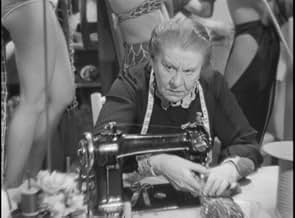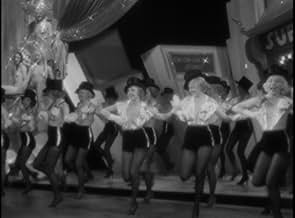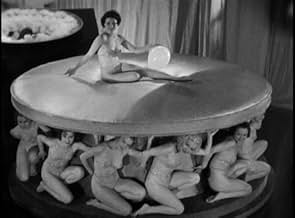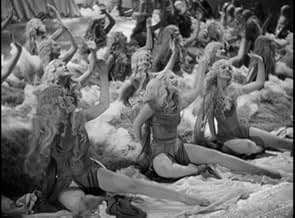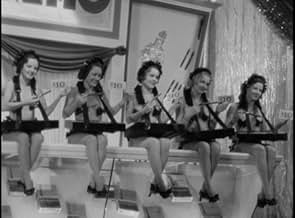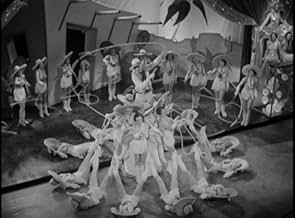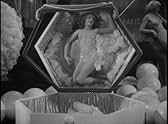A homicide detective with an eye for the ladies, investigating a murder in Earl Carroll's Vanities, allows the music revue to continue during the investigation.A homicide detective with an eye for the ladies, investigating a murder in Earl Carroll's Vanities, allows the music revue to continue during the investigation.A homicide detective with an eye for the ladies, investigating a murder in Earl Carroll's Vanities, allows the music revue to continue during the investigation.
- Awards
- 1 win total
Charles Middleton
- Homer Boothby
- (as Charles B. Middleton)
Ernestine Anderson
- Earl Carroll Girl
- (uncredited)
Lona Andre
- Lona - Earl Carroll Girl
- (uncredited)
William Arnold
- Treasurer
- (uncredited)
Lucille Ball
- Earl Carroll Girl
- (uncredited)
Featured reviews
This murder mystery with musical numbers is long on atmosphere and character but rather short on suspense and plausibility. Based on a stage play by Broadway showman Earl Carroll and others, it combines a whodunit plot with a backstage ambiance (a homicide investigation takes place on opening night at the theatre where a musical revue is being staged).
The cast is impressive and varied: tough-goofy Victor McLaglen as the police officer who leads the investigation and never fails to leer idiotically at whatever showgirl happens to be in sight; Jack Oakie (the prewar Jack Lemmon – or was Jack Lemmon the postwar Jack Oakie?) as the harassed director who must coordinate the staged performance as well as the chaos behind the scenes; the ever-homely Jessie Ralph as a wardrobe mistress with deep, dark secrets; Dorothy Stickney, who has a stunning close-up monologue near the end, as the tremulous maid madly in love with the male lead; Carl Brisson, the Danish star, as that very male lead, warbling the classic "Cocktails for Two" not once but twice; Kitty Carlisle, operatically delivering "Where Do They Come from and Where Do They Go" and other Johnston-Coslow songs; the glorious Gertrude Michael, who parted from us too soon, as a mean-spirited showgirl whose love for Brisson is spurned; the usually ridiculous Toby Wing who here at least is the center of a laugh-getting running joke.
When the plot complications get out of hand there is always an interesting performer or fun and tuneful musical number to distract the viewer. The film's most celebrated sequence is the "Marahuana" number, led by Michaels, but aside from its controversial history, it's really one of the lesser musical offerings. All of the songs here are staged as if they could actually have fit into a standard proscenium theatre space, as opposed to the cinematic fantasy setup of the Busby Berkeley style.
The cast is impressive and varied: tough-goofy Victor McLaglen as the police officer who leads the investigation and never fails to leer idiotically at whatever showgirl happens to be in sight; Jack Oakie (the prewar Jack Lemmon – or was Jack Lemmon the postwar Jack Oakie?) as the harassed director who must coordinate the staged performance as well as the chaos behind the scenes; the ever-homely Jessie Ralph as a wardrobe mistress with deep, dark secrets; Dorothy Stickney, who has a stunning close-up monologue near the end, as the tremulous maid madly in love with the male lead; Carl Brisson, the Danish star, as that very male lead, warbling the classic "Cocktails for Two" not once but twice; Kitty Carlisle, operatically delivering "Where Do They Come from and Where Do They Go" and other Johnston-Coslow songs; the glorious Gertrude Michael, who parted from us too soon, as a mean-spirited showgirl whose love for Brisson is spurned; the usually ridiculous Toby Wing who here at least is the center of a laugh-getting running joke.
When the plot complications get out of hand there is always an interesting performer or fun and tuneful musical number to distract the viewer. The film's most celebrated sequence is the "Marahuana" number, led by Michaels, but aside from its controversial history, it's really one of the lesser musical offerings. All of the songs here are staged as if they could actually have fit into a standard proscenium theatre space, as opposed to the cinematic fantasy setup of the Busby Berkeley style.
A Murder investigation goes on back stage while The Vanities, on its opening night, plays on to an unknowing audience. Odd combination of musical and murder mystery is worth a look for its cast, its terrific production numbers, and the sheer novelty of the film.
Gertrude Michael has the showy role of a bitchy actress intent on stopping the marriage between the show's stars, Kitty Carlisle and Carl Brisson, as well as starring in the infamous "Sweet Marijuana" number (which was also on a 70s Bette Midler album). So while the chorus girls shuffle around backstage, bumbling detective Victor McLaglen ogles the girls while he tries to solve the backstage murder of an unknown woman whose body is found on a catwalk above the stage.
We quickly learn that the maid (Dorothy Stickney) loves Brisson from afar, that the wardrobe lady (Jessie Ralph) is Brisson's mother, and that the stage manager (Jack Oakie) butts into everything. Lots of plots twists among the musical numbers. The show's best-known song is "Cocktails for Two" sung by Brisson and Carlisle. They also sing "Live and Love Tonight" on a tropical isle surrounded by showgirls waving feather fans to simulate the ocean. Carlisle also sings the haunting "Where Do They Come From?" Gertrude Michael sings the infamous "Sweet Marijuana." And there's a weird rhapsody that erupts into a Harlem specialty number featuring Duke Ellington!
Some terrific acting here, especially Gertrude Michael and Dorothy Stickney. Kitty Carlisle is quite good as well. Brisson, Oakie, and McLaglen are all solid.
Charles Middleton plays Homer, Toby Wing plays Nancy, Donald Meek plays the doctor, Gail Patrick plays the unknown woman, and see if you can spot Ann Sheridan, Alan Ladd and Lucille Ball among the chorus members.
Gertrude Michael has the showy role of a bitchy actress intent on stopping the marriage between the show's stars, Kitty Carlisle and Carl Brisson, as well as starring in the infamous "Sweet Marijuana" number (which was also on a 70s Bette Midler album). So while the chorus girls shuffle around backstage, bumbling detective Victor McLaglen ogles the girls while he tries to solve the backstage murder of an unknown woman whose body is found on a catwalk above the stage.
We quickly learn that the maid (Dorothy Stickney) loves Brisson from afar, that the wardrobe lady (Jessie Ralph) is Brisson's mother, and that the stage manager (Jack Oakie) butts into everything. Lots of plots twists among the musical numbers. The show's best-known song is "Cocktails for Two" sung by Brisson and Carlisle. They also sing "Live and Love Tonight" on a tropical isle surrounded by showgirls waving feather fans to simulate the ocean. Carlisle also sings the haunting "Where Do They Come From?" Gertrude Michael sings the infamous "Sweet Marijuana." And there's a weird rhapsody that erupts into a Harlem specialty number featuring Duke Ellington!
Some terrific acting here, especially Gertrude Michael and Dorothy Stickney. Kitty Carlisle is quite good as well. Brisson, Oakie, and McLaglen are all solid.
Charles Middleton plays Homer, Toby Wing plays Nancy, Donald Meek plays the doctor, Gail Patrick plays the unknown woman, and see if you can spot Ann Sheridan, Alan Ladd and Lucille Ball among the chorus members.
Detective Victor McLaglen has to investigate a backstage murder and not mess up the debut of pal Jack Oakie's musical revue. You won't care about the rather hum-drum murder, the musical numbers will floor you. During a performance of "Sweet Marijuana", (this virtual lullaby to reefer has topless back-up dancers!) blood from the murder victim in the rafters drips down on the dancing girls! Toby Wing is fun and cute as the flirty chorus girl with a crush on Oakie. Loads fun here!
Earl Carroll's MURDER AT THE VANITIES (Paramount, 1934), directed by Mitchell Leisen, from the stage work by Earl Carroll and Rufus King, marked the studio's contribution to the stage musical of the precode era. Almost in the league as Warner Brothers' WONDER BAR (1934), with plot set in a single night revolving around an handful of sinful characters, VANITIES contains its own assortment of odd characters, great interplay between Jack Oakie and Victor McLaglen, risqué dialog and semi-nude chorines listed in the opening credits as "The Most Beautiful Girls in the World," makes this particular production something to consider.
Producer Earl Carroll is ill and unable to attend the opening night of his Vanities, which leaves Jack Ellery (Jack Oakie), former reporter turned stage director, in charge. Eric Lander (Carl Brisson) and Anne Ward (Kitty Carlisle), the show's leading couple, plan on getting married after the performance, much to the dismay of temperamental blues singer, Rita Ross (Gertrude Michael), who wants Eric for herself and will stop at nothing to get him. Before the curtain goes up, Anne finds her life being threatened by falling props and sandbags that nearly miss her, causing Ellery to notify his friendly rival, Police Lieutenant Bill Murdock (Victor McLaglen) to investigate. Sadie Evans (Gail Patrick), a female investigator hired by Eric, arrives to return valuable information stolen from him by Rita. Because Miss Evans has learned more than she should, her life is threatened by Helene Smith (Jessie Ralph), a wardrobe woman with a mysterious past of her own. During a performance, blood is felt dripping upon a chorus girl, causing her to scream and Murdock to trace the dripping blood to the body of Sadie Evans, stabbed by a large pin. When Rita threatens to expose what she knows about Eric in Vienna, she, too is murdered by a mysterious bullet. The show goes on as Ellery and Murdock work together in hope of rounding up the usual suspects.
Other members of the cast include Charles Middleton as Shakespearean actor Homer Boothby; Donald Meek as Doctor J.T. Saunders; and Barbara Fritchie as Viven. Notable performances go out to the comic-strip appearance of Dorothy Stickney as Norma Watson, Rita's abused maid; and Toby Wing as Nancy, the giggly blonde wanting desperately some time alone with Jack Ellery, who constantly casts her aside until later. Kitty Carlisle, best known for her role opposite the Marx Brothers in A NIGHT AT THE OPERA (MGM, 1935), and as TV's panelist on the 1960-70s quiz show, TO TELL THE TRUTH, performs well in her motion picture debut, especially opposite Carl Brisson who, at times, resembles Carlisle's NIGHT AT THE OPERA love interest, Allan Jones, but minus the Danish accent.
A well-crafted murder mystery with an abundance of fine tunes by Arthur Johnson, Sam Coslow and Johnny Burke, include: "Cocktails for Two" (sung by Carl Brisson); "Where Do They Come From and Where Do They Go?" (sung by Kitty Carlisle); "Lovely One" (sung by male chorus); "Where Do They Come From and Where Do They Go?" (concluded by Carlisle); "Live and Love Tonight" (sung by Brisson); "Sweet Marijuana" (sung by Gertrude Michael); "Cradle Me With a Hatcha Lullaby" (instrumentally performed by male dancers); "The Rape of the Rhapsody" (sung by Brisson, orchestrated by Duke Ellington and his Band; reprized by Kitty Carlisle); "Doing the Ebony Rhapsody" (sung by Gertrude Michael); "Cocktails for Two" (sung by Brisson, chorus); and Finale: "Live and Love Tonight," "Sweet Marijuana" and "Cocktails for Two."
While "Cocktails for Two" became a song hit that that was later spoofed in the 1940s by band-leader Spike Jones, "Live and Love Tonight" is actually one of the better and nicer tunes helped by its production number treatment set on an island with Brisson as the sole male surrounded by under-dressed island girls (Carlisle included) and others using ostrich feathers as water waves. Gertrude Michael's rendition to "Sweet Marijuana" surrounded by dancing shadows, appears to be the sort of tune 35 years ahead of its time, fitting more into the 1960s hippie generation than 1934. Franz Liszt's "Second Hungarian Rhapsody," the longest of the production numbers, is an interesting attempt turning slow tempo classical composition to upbeat jazzy orchestration with Duke Ellington at the piano. Larry Ceballos and LeRoy Prinz are credited for their impressive (or suggestive) choreography.
Rarely televised possibly due to its subject matter that make precode movies all the more worth seeing today, MURDER AT THE VANITIES, having been one of an assortment of rare classic films aired Sunday nights (1974-75) on Hartford, Connecticut's WFSB, Channel 3, did become available on home video in the 1980s (retail price: $59.95) and finally DVD in 2009. Its availability should add to the rediscovery of buried treasures such as this. (***)
Producer Earl Carroll is ill and unable to attend the opening night of his Vanities, which leaves Jack Ellery (Jack Oakie), former reporter turned stage director, in charge. Eric Lander (Carl Brisson) and Anne Ward (Kitty Carlisle), the show's leading couple, plan on getting married after the performance, much to the dismay of temperamental blues singer, Rita Ross (Gertrude Michael), who wants Eric for herself and will stop at nothing to get him. Before the curtain goes up, Anne finds her life being threatened by falling props and sandbags that nearly miss her, causing Ellery to notify his friendly rival, Police Lieutenant Bill Murdock (Victor McLaglen) to investigate. Sadie Evans (Gail Patrick), a female investigator hired by Eric, arrives to return valuable information stolen from him by Rita. Because Miss Evans has learned more than she should, her life is threatened by Helene Smith (Jessie Ralph), a wardrobe woman with a mysterious past of her own. During a performance, blood is felt dripping upon a chorus girl, causing her to scream and Murdock to trace the dripping blood to the body of Sadie Evans, stabbed by a large pin. When Rita threatens to expose what she knows about Eric in Vienna, she, too is murdered by a mysterious bullet. The show goes on as Ellery and Murdock work together in hope of rounding up the usual suspects.
Other members of the cast include Charles Middleton as Shakespearean actor Homer Boothby; Donald Meek as Doctor J.T. Saunders; and Barbara Fritchie as Viven. Notable performances go out to the comic-strip appearance of Dorothy Stickney as Norma Watson, Rita's abused maid; and Toby Wing as Nancy, the giggly blonde wanting desperately some time alone with Jack Ellery, who constantly casts her aside until later. Kitty Carlisle, best known for her role opposite the Marx Brothers in A NIGHT AT THE OPERA (MGM, 1935), and as TV's panelist on the 1960-70s quiz show, TO TELL THE TRUTH, performs well in her motion picture debut, especially opposite Carl Brisson who, at times, resembles Carlisle's NIGHT AT THE OPERA love interest, Allan Jones, but minus the Danish accent.
A well-crafted murder mystery with an abundance of fine tunes by Arthur Johnson, Sam Coslow and Johnny Burke, include: "Cocktails for Two" (sung by Carl Brisson); "Where Do They Come From and Where Do They Go?" (sung by Kitty Carlisle); "Lovely One" (sung by male chorus); "Where Do They Come From and Where Do They Go?" (concluded by Carlisle); "Live and Love Tonight" (sung by Brisson); "Sweet Marijuana" (sung by Gertrude Michael); "Cradle Me With a Hatcha Lullaby" (instrumentally performed by male dancers); "The Rape of the Rhapsody" (sung by Brisson, orchestrated by Duke Ellington and his Band; reprized by Kitty Carlisle); "Doing the Ebony Rhapsody" (sung by Gertrude Michael); "Cocktails for Two" (sung by Brisson, chorus); and Finale: "Live and Love Tonight," "Sweet Marijuana" and "Cocktails for Two."
While "Cocktails for Two" became a song hit that that was later spoofed in the 1940s by band-leader Spike Jones, "Live and Love Tonight" is actually one of the better and nicer tunes helped by its production number treatment set on an island with Brisson as the sole male surrounded by under-dressed island girls (Carlisle included) and others using ostrich feathers as water waves. Gertrude Michael's rendition to "Sweet Marijuana" surrounded by dancing shadows, appears to be the sort of tune 35 years ahead of its time, fitting more into the 1960s hippie generation than 1934. Franz Liszt's "Second Hungarian Rhapsody," the longest of the production numbers, is an interesting attempt turning slow tempo classical composition to upbeat jazzy orchestration with Duke Ellington at the piano. Larry Ceballos and LeRoy Prinz are credited for their impressive (or suggestive) choreography.
Rarely televised possibly due to its subject matter that make precode movies all the more worth seeing today, MURDER AT THE VANITIES, having been one of an assortment of rare classic films aired Sunday nights (1974-75) on Hartford, Connecticut's WFSB, Channel 3, did become available on home video in the 1980s (retail price: $59.95) and finally DVD in 2009. Its availability should add to the rediscovery of buried treasures such as this. (***)
Murder mystery with a musical backdrop shows its age but has some interesting numbers in particular Duke Ellington's orchestra's production and the now infamous Marijuana number with discreetly covered but unquestionably topless showgirls. Lost in amongst the hundreds of hopeful showgirls and chorus boys are Lucille Ball, Ann Sheridan and Alan Ladd all still years away from any kind of fame and hard to spot. The acting is okay but this is more of a curio as a good example of some of the things that were common before the code, implied or actual nudity, drug references and occasional swearing that would disappear for almost 3 decades when the Hayes code took full effect within a very short time after this film premiered.
Did you know
- TriviaMany of the Earl Carroll Girls featured in the film were authentic cast members from Carroll's stage show, which ran from September 12th to November, 1933, at the New Amsterdam Theatre, and at the Majestic Theatre from November 6th, 1933 to March 10th, 1934. These cast members were brought out to Hollywood from New York especially for this film, and many stayed to pursue film careers.
- GoofsWhen the body of the woman on the catwalk is turned on her back, you can see the actress' chest rise and fall as she takes a breath.
- Quotes
[last lines]
Jack Ellery: Nancy, what shall I do?
Nancy: Oh, Mr. Ellery!
Jack Ellery: C'mon, let's do it.
- ConnectionsEdited into Miousic 1937 (1936)
- SoundtracksEbony Rhapsody
(uncredited)
by Arthur Johnston and Sam Coslow
Sung by Carl Brisson, Kitty Carlisle and Gertrude Michael
- How long is Murder at the Vanities?Powered by Alexa
Details
- Runtime1 hour 29 minutes
- Color
- Aspect ratio
- 1.37 : 1
Contribute to this page
Suggest an edit or add missing content



